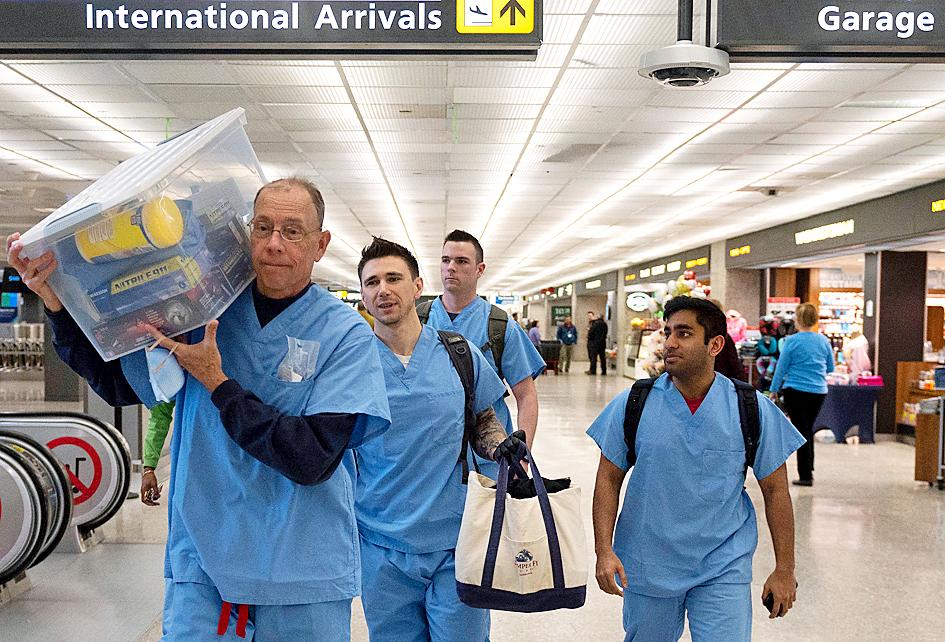US President Joe Biden’s administration is lifting its requirement that international travelers test negative for COVID-19 within a day before boarding a flight to the US, ending one of its last remaining mandates designed to contain the spread of COVID-19.
The US Centers for Disease Control and Prevention (CDC) announced on Friday that the requirement would be lifted today.
Non-US citizens would still be required to show proof of being fully vaccinated against COVID-19 before entering the country.

Photo: AFP
The health agency said it would continue to monitor the state of the COVID-19 pandemic and reassess the need for a testing requirement if the situation changes.
“This step is possible because of the progress we’ve made in our fight against COVID-19,” US Secretary of Health Xavier Becerra said.
Airlines and tourism groups have been pressing the administration for months to eliminate the testing requirement, saying it discourages people from booking international trips because they could be stranded overseas if they contract the virus on their trip.
US Travel Association president Roger Dow called lifting the testing rule “another huge step forward for the recovery of inbound air travel and the return of international travel to the United States.”
Airlines said the rule was put into effect when few Americans were vaccinated against COVID-19, while CDC figures now show that 71 percent of those aged five or older are fully vaccinated.
They said that people entering the US at land borders are not required to test negative for COVID-19, although they must show proof of vaccination.
While domestic US travel has returned nearly to pre-pandemic levels, international travel — which is very lucrative for the airlines — has continued to lag.
Last month, US international air travel remained 24 percent below 2019 levels, with declines among US and foreign citizens, data provided by trade group Airlines for America showed.

TRAGEDY STRIKES TAIPEI: The suspect died after falling off a building after he threw smoke grenades into Taipei Main Station and went on a killing spree in Zhongshan A 27-year-old suspect allegedly threw smoke grenades in Taipei Main Station and then proceeded to Zhongshan MRT Station in a random killing spree that resulted in the death of the suspect and two other civilians, and seven injured, including one in critical condition, as of press time last night. The suspect, identified as a man surnamed Chang Wen (張文), allegedly began the attack at Taipei Main Station, the Taipei Fire Department said, adding that it received a report at 5:24pm that smoke grenades had been thrown in the station. One man in his 50s was rushed to hospital after a cardiac arrest

SAFETY FIRST: Double the number of police were deployed at the Taipei Marathon, while other cities released plans to bolster public event safety Authorities across Taiwan have stepped up security measures ahead of Christmas and New Year events, following a knife and smoke bomb attack in Taipei on Friday that left four people dead and 11 injured. In a bid to prevent potential copycat incidents, police deployments have been expanded for large gatherings, transport hubs, and other crowded public spaces, according to official statements from police and city authorities. Taipei Mayor Chiang Wan-an (蔣萬安) said the city has “comprehensively raised security readiness” in crowded areas, increased police deployments with armed officers, and intensified patrols during weekends and nighttime hours. For large-scale events, security checkpoints and explosives

A car bomb killed a senior Russian general in southern Moscow yesterday morning, the latest high-profile army figure to be blown up in a blast that came just hours after Russian and Ukrainian delegates held separate talks in Miami on a plan to end the war. Kyiv has not commented on the incident, but Russian investigators said they were probing whether the blast was “linked” to “Ukrainian special forces.” The attack was similar to other assassinations of generals and pro-war figures that have either been claimed, or are widely believed to have been orchestrated, by Ukraine. Russian Lieutenant General Fanil Sarvarov, 56, head

PUBLIC SAFETY: The premier said that security would be tightened in transport hubs, while President Lai commended the public for their bravery The government is to deploy more police, including rapid response units, in crowded public areas to ensure a swift response to any threats, President William Lai (賴清德) said yesterday after a knife attack killed three people and injured 11 in Taipei the previous day. Lai made the remarks following a briefing by the National Police Agency on the progress of the investigation, saying that the attack underscored the importance of cooperation in public security between the central and local governments. The attack unfolded in the early evening on Friday around Taipei Main Station’s M7 exit and later near the Taipei MRT’s Zhongshan